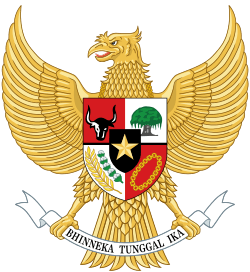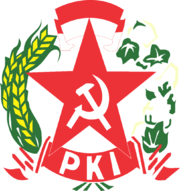Nasakom
Nasakom was a political concept during the Sukarno presidency in Indonesia. It is an acronym based on the Indonesian words NASionalisme ('nationalism'), Agama ('religion'), and KOMunisme ('communism').[1][2][3][4]
By 1956 Sukarno was openly criticising parliamentary democracy, stating that it was "based upon inherent conflict" which ran counter to Indonesian notions of harmony as being the natural state of human relationships. Instead, he sought a system based on the traditional village system of discussion and consensus, under the guidance of village elders. He proposed the threefold blend of nationalism, religion and communism into a co-operative 'Nas-A-Kom' government. This was intended to appease the three main factions in Indonesian politics — the army, Islamic groups, and the communists. With the support of the military, in February he proclaimed 'Guided Democracy', and proposed a cabinet that would represent all the political parties of importance (including the PKI).
References
- ↑ Echols, John M.; Shadily, Hassan (1989), Kamus Indonesia Inggris: An Indonesian-English Dictionary (3 ed.), Jakarta: PT Gramedia, ISBN 979-403-756-7
- ↑ Friend, T. (2003). Indonesian Destinies. Harvard University Press. pp. 25, 82–83. ISBN 0-674-01137-6.
- ↑ Ricklefs, M. C. (1991). A History of Modern Indonesia since c. 1300 (2 ed.). MacMillan. p. 268. ISBN 0-333-57689-6. LCCN 94102636. OCLC 30320024. OL 1135607M. ISBN 0-333-57690-X. alternate version at Google Books with preview
- ↑ Vickers, Adrian (2005). A History of Modern Indonesia. Cambridge University Press. p. 146. ISBN 0-521-54262-6.



